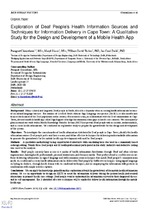Exploration of Deaf people’s health information sources and techniques for information delivery in Cape Town: A qualitative study for the design and development of a mobile health application
Date
2016Author
Chininthorn, Prangnat
Glaser, Meryl
Tucker, William David
Diehl, Jan Carel
Metadata
Show full item recordAbstract
BACKGROUND: Many cultural and linguistic Deaf people in South Africa face disparity when accessing health information because of social and language barriers. The number of certified South African Sign Language interpreters (SASLIs) is also insufficient to meet the demand of the Deaf population in the country. Our research team, in collaboration with the Deaf communities in Cape Town, devised a mobile health app called SignSupport to bridge the communication gaps in health care contexts. We consequently plan to extend our work with a Health Knowledge Transfer System (HKTS) to provide Deaf people with accessible, understandable, and accurate health information. We conducted an explorative study to prepare the groundwork for the design and development of the system. OBJECTIVES: To investigate the current modes of health information distributed to Deaf people in Cape Town, identify the health information sources Deaf people prefer and their reasons, and define effective techniques for delivering understandable information to generate the groundwork for the mobile health app development with and for Deaf people. METHODS: A qualitative methodology using semistructured interviews with sensitizing tools was used in a community-based codesign setting. Twenty-three Deaf people and 10 health professionals participated in this study. Inductive and deductive coding was used for the analysis. RESULTS: Deaf people currently have access to 4 modes of health information distribution through: Deaf and other relevant organizations, hearing health professionals, personal interactions, and the mass media. Their preferred and accessible sources are those delivering information in signed language and with communication techniques that match Deaf people’s communication needs. Accessible and accurate health information can be delivered to Deaf people by 3 effective techniques: using signed language including its dialects, through health drama with its combined techniques, and accompanying the information with pictures in combination with simple text descriptions. CONCLUSIONS: We can apply the knowledge gained from this exploration to build the groundwork of the mobile health information system. We see an opportunity to design an HKTS to assist the information delivery during the patient-health professional interactions in primary health care settings. Deaf people want to understand the information relevant to their diagnosed disease and its self-management. The 3 identified effective techniques will be applied to deliver health information through the mobile health app.

